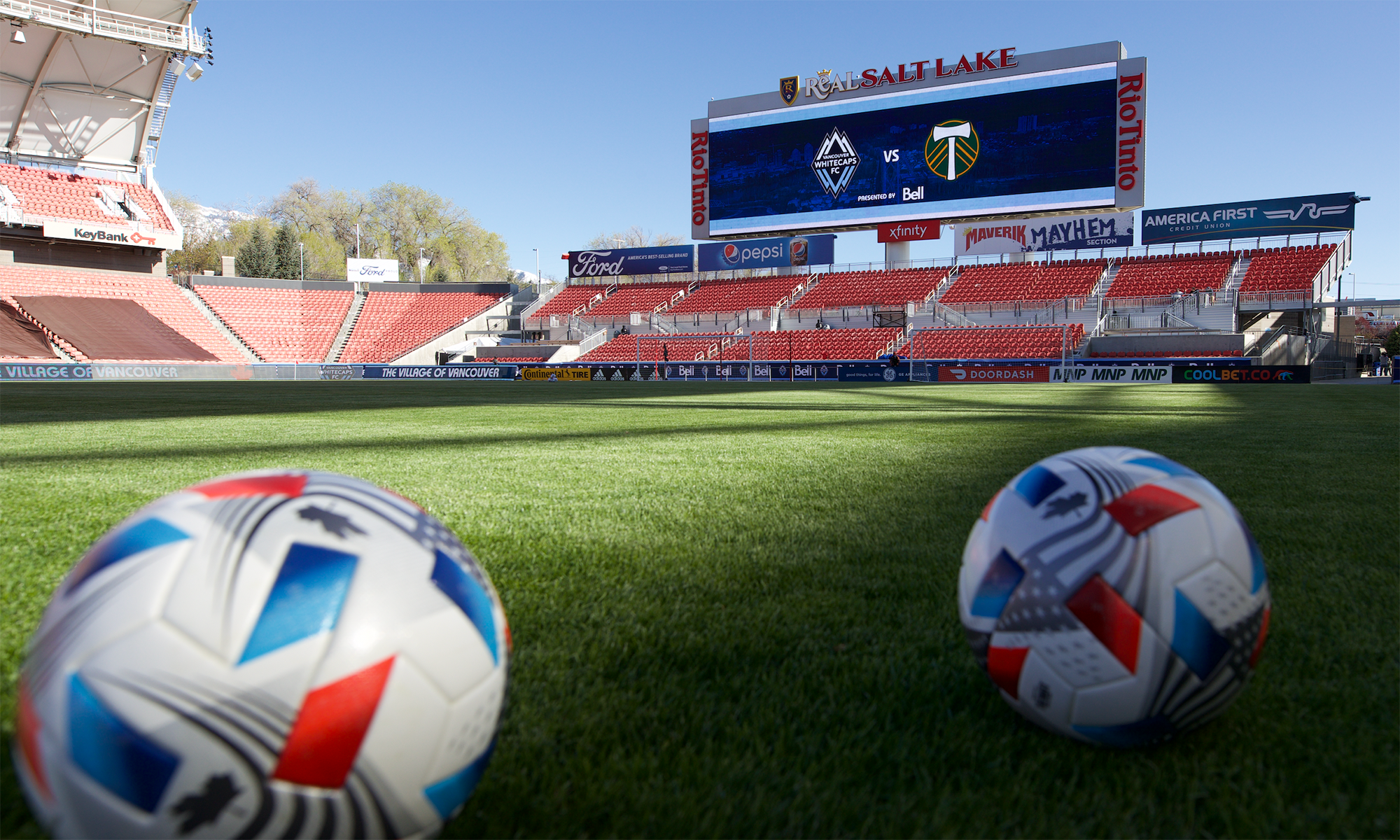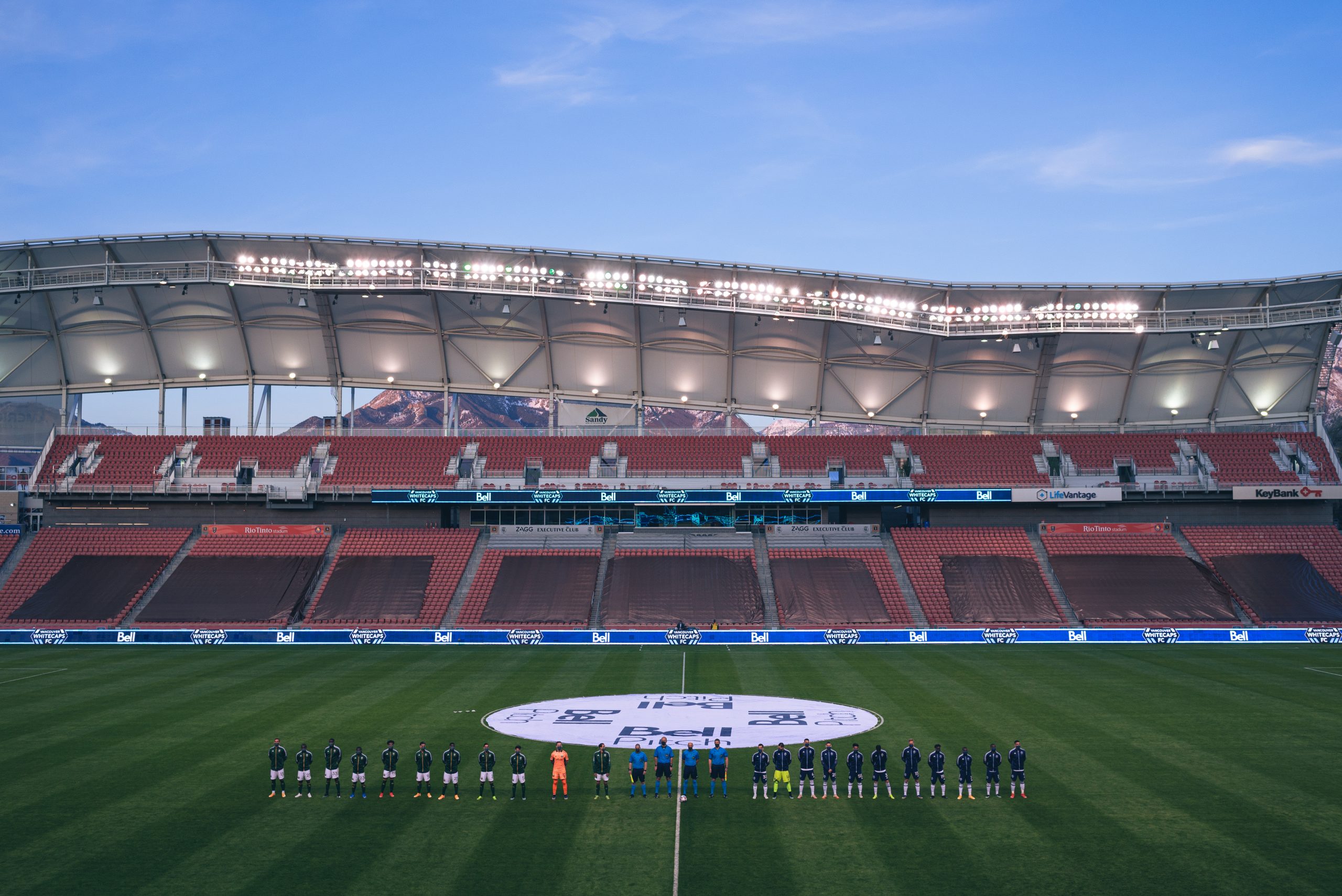On the Pitch: Vancouver Whitecaps Call Rio Tinto Stadium Home With Assist From Real Salt Lake In-Game Crew
Whitecaps' Jeremy Benjamin teams with RSL's Stacey Taggert on live show
Story Highlights
The past 10 months have been a whirlwind for Major League Soccer. After last summer’s MLS Is Back Tournament in the Orlando bubble and the eventual return to empty home stadiums, the attendance of some clubs in the league are returning to pre-pandemic levels. Much like At the Ballpark, On the Gridiron, On the Hardwood, and At the Rink, SVG’s On the Pitch takes you into the control room with in-venue crews to understand what their job is like before, during, and after the official’s whistle is blown.
This week, MLB’s Toronto Blue Jays packed their bags, moving from one “home” ballpark to another, and traded out TD Ballpark in Dunedin, FL, for Sahlen Field in Buffalo, NY. The Toronto Raptors spent the entire 2020-21 NBA campaign as the “Tampa Raptors,” in a temporary residency at Amalie Arena.
The past year in North American sports has turned numerous Canadian franchises into nomads: wandering multimillion-dollar megabrands looking for a friend to let them crash on the couch.
That is particularly true for Major League Soccer’s Canadian clubs. Take Vancouver Whitecaps FC, for example. The last time they played a match in their home stadium of BC Place was Feb. 29, 2020: 461 days ago. Since the coronavirus outbreak last March and the restart of play in MLS last July, the Whitecaps have called three stadiums home: Disney World (in the MLS Is Back bubble); Providence Park in Portland, OR (at the conclusion of the 2020 campaign); and now Rio Tinto Stadium in Sandy, UT.
If home truly is where the heart is, the staff at Vancouver Whitecaps must have a pretty big heart.
“We’ve gotten used to producing for other stadiums,” says Jeremy Benjamin, specialist, game presentation, events and experience, Vancouver Whitecaps. “It’s quite strange, but I think one of the best things is that the people we are working with are incredibly gifted and what they do and the MLS game-presentation family is always there for you. We’re just trying to make it work and make the best atmosphere that we can for our team and for broadcast. It has been interesting but really challenging and fun right now.”
MORE ON THE PITCH INTERVIEWS:
- Philadelphia Union Enjoy First Full Season With HDR Videoboard at Subaru Park
- Atlanta United Embraces Crowd at Mercedes-Benz Stadium as First MLS Club To Return to Full Capacity
- Sporting KC Focuses on Firing Up Limited-Capacity Crowd at Children’s Mercy Park
- NYCFC Tweaks In-Venue Show To Welcome Full-Capacity Crowds Back to Yankee Stadium
- Toronto FC Beats Geography With Tag-Teamed Productions, Digital Platform
- Colorado Rapids Prep for State’s Largest Fireworks Show, Ceremony for Pablo Mastroeni on July 4
- Real Salt Lake Shares Rio Tinto Stadium With Vancouver Whitecaps FC
- Orlando City SC Continues Relationship With USWNT, Hosts Toronto FC in Unique MLS Season
The MLS Game-Presentation ‘Family’
This season, with none of the video staff embedded with the club in Utah, Benjamin’s boots on the ground has been Real Salt Lake Director, Game Presentation, Stacey Taggert. The Whitecaps team creates the content, but the actual execution of the show is done on match day by the in-game–presentation crew from Real Salt Lake.

Vancouver Whitecaps are currently playing home matches at Rio Tinto Stadium, home facility of Real Salt Lake. (Photo: Vancouver Whitecaps FC)
Prior to a match, Benjamin and his colleagues in Vancouver send all the scripting to the RSL staff. That includes run of show, LED rotation, and competition timelines. All major video assets are delivered directly through a file-transfer site. Benjamin makes things as streamlined and organized as possible so it’s an easy pickup for Taggert and her team.
Key video content — standards like the prematch hype video, an intro video, an opening sting, a captain chant — is designed to build the atmosphere prior to the opening kick. And there’s plenty of Vancouver-themed elements, such as sizzles with scenic shots from the city.
“We want to drive that connection to home,” says Benjamin, a childhood fan of the Vancouver Whitecaps, a ball boy when the club played at old Swangard Stadium, and a full-time employee of the organization since 2018. “We’re trying to build a sense of community no matter where [the team] is. That’s the big objective.”
For him, the past year is a testament to the great people across MLS. When the club was in Portland, he worked with Timbers Director, Event and Promotions, Morgan Lunz and Production Manager Erick Alley. Now, in Utah, Taggert and RSL Videoboard Director Mike Chidsey have served as ambassadors of the boards.
“Just incredibly awesome people,” says Benjamin. “The operations side, the First Team side, the hospitality they give us are top-notch. Stacey is such a treat to work with. She’s putting out some of the fires that we’d be putting out at BC Place: partners needing last-minute additions, cleaning up content. She always makes it work, and it has been such a pleasure.”
Accommodating Artificial Crowd Sound
One of the most significant differences between the Vancouver Whitecaps atmosphere and that of Real Salt Lake at Rio Tinto Stadium is that 10,000 fans have been allowed to attend RSL matches since early March. In fact, a recent announcement says the club could go back to nearly full capacity as soon as June 18. That means Taggert and her team have already returned to a standard style of game presentation, using video and music elements to hype up the home crowd.

Vancouver Whitecaps have not hosted fans at any of its “home” matches at Rio Tinto Stadium. Fans will be welcome for the first time at the club’s next “home” match.
Meanwhile, Whitecaps matches remain audience-free, spurring the use of artificial crowd sound in the building. The Whitecaps’ in-venue team used recorded crowd audio from matches at BC Place to build a menu of crowd chants and reactions to deploy during the game. Taggert’s side has been happy to oblige in meeting that challenge.
“We have generic crowd noise during the entire match and specific chants that we’ll play every five minutes or so to add an atmosphere,” says Taggert. “It has been fun to do because it’s such a contrast from what we’re doing with Real Salt Lake.”
Says Benjamin, “We’re using this as an opportunity to connect with our supporters’ groups and our fans. We want them to feel connected to our moments there. At the same, for our players and personnel [in Utah], having them hear the Whitecaps chant reminds them that this is bigger than just what’s going on on the pitch and that this is for our fanbase and our club.”
Praise for the Personnel Onsite, Hopes for a Return Home
Although much of the work is being done by many back home in Vancouver, Benjamin also notes the critical contributions by crew members embedded with the club in Utah. That includes Chief Communications Officer Tom Plasteras, who, in addition to performing his full-time duties, has served as a key liaison between the Whitecaps’ game-presentation team and RSL.
“Those people have given up a lot. They are away from their families,” Benjamin says. “I’m super-privileged to be able to work from home. Major shoutout to the people that are down there and the folks at MLS that have made this experience as seamless as it has been.”
As for the eventual return north of the border, the club officially announced that its entire slate of home matches through July will be played at Rio Tinto Stadium with fans allowed in attendance for matches beginning at their next home match on June 23. The remainder of the Whitecaps’ home schedule remains officially TBD. They’re hoping for a triumphant return to “Van.”
The Vancouver Whitecaps are next in action on June 18 at 7 p.m. ET, fittingly enough, in an “away” match against Real Salt Lake at Rio Tinto Stadium. They play their next “home” match at Rio Tinto Stadium on June 23 vs. LA Galaxy.
